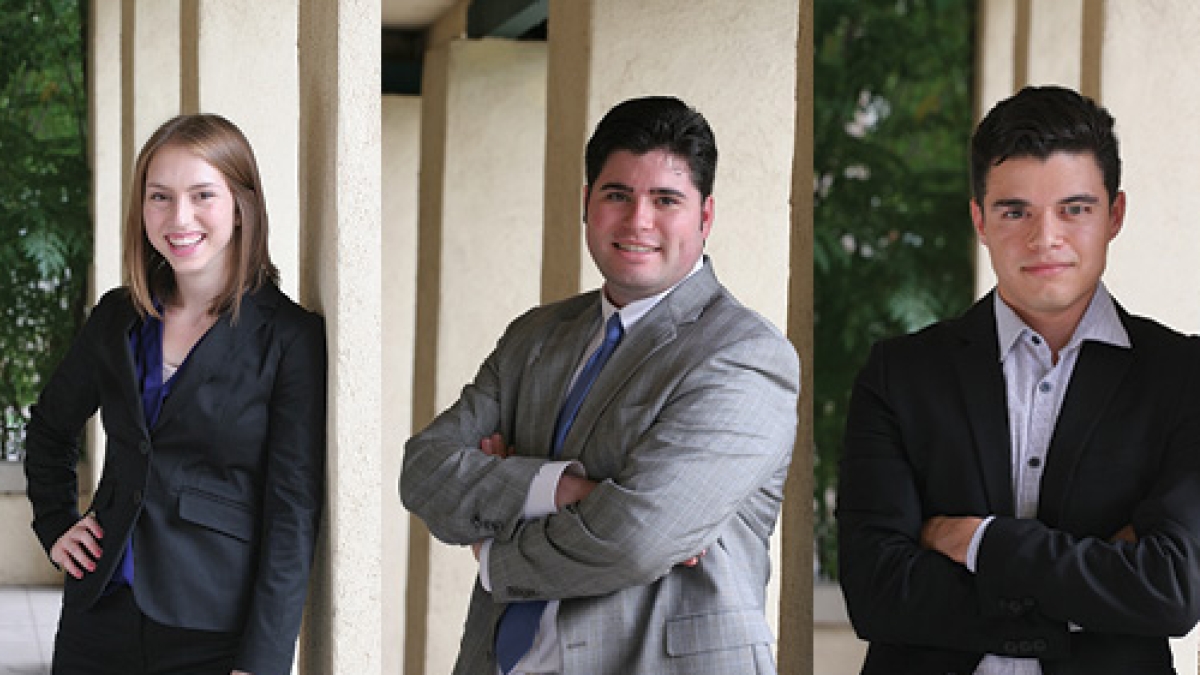Team of students aims to enhance minority human rights

Looking to provide solutions for complicated social issues, an interdisciplinary team of students at Arizona State University decided to create an exchange program that will drive social change within their community.
Ashley Brennan, Josue Macias and Stephen Calderon met through the College of Public Programs’ Spirit of Service Scholars initiative, a program offered to exceptional ASU students in all majors that are dedicated to careers in the public and nonprofit sectors.
After Brennan and Macias attended an all-day seminar on immigration reform, they left feeling inspired to create change and empower others to defend and extend minority human rights.
“I realized how much I didn’t know and how oblivious I was to everything that was happening in our immediate local community, as well as on a larger global scale,” says Brennan, a sophomore psychology major. “What we wanted to do was recreate the experience we had, and also enhance it.”
The students came up with a service learning model that puts individuals through an intensive course to learn about different social and civil issues. The local exchange students will then partner with local families, refugee centers, immigrant community centers and nonprofits in a weeklong exchange. Called Local Exchange, Global Change, the program aims to prepare college students for global change by training them to recognize and combat systematic inequality on a local scale.
Slated to start a pilot program in the winter of 2014, Local Exchange, Global Change will engage students from all degree programs and academic disciplines to create change in their communities through an exchange program focused on the advancement of immigration and refugee rights.
“We want to mold Local Exchange, Global Change around a learning service model, where we’re really there to learn how we can collaboratively serve each other,” says Brennan.
Macias, a senior public service and public policy major, notes that getting participants to experience life in somebody else’s shoes is key to changing their perspectives. “We think that if you do that in your own community, you no longer ignore the human rights violations that have been in your own backyard,” he says.
Macias will be in charge of program development, Brennan will handle the group’s marketing, and Calderon, a nonprofit leadership and management major, will oversee finances.
With the guidance of mentors, the students successfully completed the application process for the 2014 Clinton Global Initiative University (CGI U), which will be held at ASU’s Tempe campus, March 21-23. Local Exchange, Global Change was accepted into the CGI U human rights focus area. The group was also selected as ASU student finalists for the Social Venture Partners Fast Pitch Competition, along with other innovative nonprofits in Maricopa County.
“It’s been great just working with the mentors, and then having them connect us to this huge network that they have ... it’s been a little nerve-wracking to see it grow as fast as it has from September to now, but hopefully we get the funding to start our first cohort and see where we go from there,” says Macias.
Macias notes that for the students, forming relationships with mentors and business professionals was key to developing their business plan. In addition to the mentors already assigned to the students, the group reached out to Delia Saenz, Brennan’s former honors social psychology professor. The group was able to approach the program development from a social psychological perspective with Saenz’s guidance.
“On the one hand, it creates awareness for everybody. For the students that are coming in and participating, it gives them a really hands-on understanding of what the issues are related to; for example, immigration and bias in the community,” says Saenz, associate professor in psychology and vice provost for undergraduate education at ASU.
The students behind Local Exchange, Global Change plan to earn enough funding to start their first exchange program with 10 to 20 students.
“We’re really excited now and we really want to accumulate the funds that we need in order to start our first cohort,” Macias says.
Saenz says she thinks ASU fosters a climate of the entrepreneurial spirit, which allows student entrepreneurs like Brennan, Macias and Calderon to flourish.
“The beauty of it builds in the energy of young people coming in with a fresh perspective,” Saenz says.